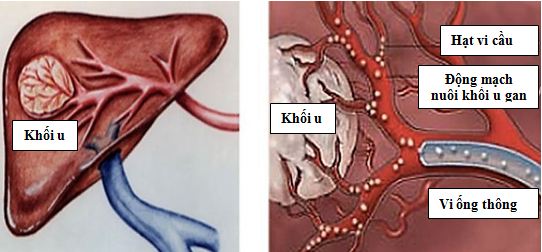Liver cancer is a common and constantly increasing disease, according to the World Health Organization. In 2012, UMB also had the sixth annual incidence of cancers (782000 new cases per year, 10.1 case of 100000 people), but the second leading cause of cancer deaths (745,000 deaths), and about 5.6% of all cancers. The highest incidence in East Asia and Southeast Asia, including Vietnam, is directly related to the hepatitis B and C virus infection, in addition to alcohol abuse.
Liver cancer has a bad prognosis, most cases are diagnosed at advanced or late stages and the mortality is very high. So far there have been many methods of UTTBG treatment such as liver transplantation, liver transplantation, chemical hepatic artery node node, alcohol injection, high frequency radiofrequency ablation and internal or external radiotherapy. For each stage of the disease, there is potential underlying liver disease, with appropriate treatment options.
Drug-Loaded Microspheres is a new treatment developed by scientists around the world and has been used by Vietnamese doctors for several years. years back. The principle of the method is the use of microbial hemagglutination to block the blood vessels to heal the liver, it both causes the switch to both bring chemicals and release chemicals in a sustainable way, allowing to maintain concentration. The drug stabilizes in tumors and kills tumor cells while reducing diffusion of the drug to the general circulation of the body, minimizing the adverse effects of chemicals such as nausea. , vomiting, fatigue, hair loss ...
Chemical germinal microbial leukemia has been shown in clinical trials worldwide to have better tumor control efficacy, longer duration of life, and fewer side effects than the occlusion method. traditional circuit.
With this method, the patient needs only a local anesthetic in the inguinal area, and the physician inserts a small catheter into the artery and then extracts the superciliary catheter into the arterial branch of the hepatic tumor. Glutamine particle load loading chemical blockage whole artery feeding u. This is a minimally invasive approach, with the advantage that the patient is not anesthetized, alert and able to talk to the doctor, after the intervention, almost no complicated care, early discharge .
As with other liver cancer treatments, this method is only applicable and highly effective for patients with early or intermediate liver cancer. The progression and final stages are not good.

Technique of the hepatic artery node by microbial gland loading chemicals
At the Phu Tho General Hospital, doctors have performed this new treatment successfully for some patients with liver cancer (referred to as node therapy). Some pictures of prostatic artery node interventions for benign prostatic hypertrophy in Phu Tho General Hospital:
Patient H. H. H., 71 years old, diagnosed liver cancer on the basis of cirrhosis, chronic hepatitis B, 2 tumors in the liver must size ~ 3.5 x 2.3 cm and 1.7 cm. Hepatocyte node method was successfully performed by micrograph of chemical loading and tumor nodules were fully closed. After the node only patients have mild pain in the liver, no fever, no nausea, normal eating, discharge after 2 days.


Images of liver tumors measuring 3.5 x 2.3 cm and 1.7 cm in magnetic resonance imaging.
Picture of liver tumors on the angiogram and after the node completely obstructs the artery.


Doctors are doing interventional procedures for patients.
Patients need to refer to the method can contact Dr. Tran Quang Luc, Department of Diagnostic Imaging - General Hospital of Phu Tho province, Tel 0915399368 or Email: drtranquangluc@gmail.com; Or contact the customer care center of Phu Tho province.
Doctor: Quang Luc